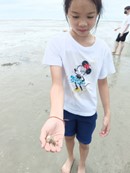Sky Mirror Study Visit 24th Aug 2024
- Bilden Creative Learning
- Oct 9, 2024
- 3 min read
Perception, Mind Set, and Personal Experience in Study Visits
Introduction
Study Visits as an experiential learning are important to complement the classroom-based learning. These visits not only expose children to new environments and knowledge but also play a crucial role in shaping their perception and mind set through their personal experience. The impact of these visits on the students’ minds is profound, influencing how they perceive the world, approach learning, and develop cognitive and social skills.

Perception in Study Visits
Perception is the process by which children interpret and make sense of the world around. The study visit to Sky Mirror served as a transformative experience for them and offered an opportunity to refresh their perspectives. Before the visit, many students age 7 to 9 expressed hesitation and fear, with some saying, "Teacher, the crab will bite me, I don't want to go," or "Teacher, if I step on a shell, I will bleed, no, I don't want to go." These anxieties reflected their limited understanding of the natural environment and the creatures that inhabit it.
However, once they arrived at the mangrove swamp and seabed, their apprehensions quickly dissipated. The students, initially fearful, began to explore the area with curiosity and excitement. They squatted down, eagerly searching for mudskippers, crustaceans, and mollusks. With their own eyes and touch from the hands, they saw the size and felt the movement of the sea snail on their palm. With this hands-on experience, they gained a real understanding of this sea snail. With newfound knowledge and confidence, they used their hands to catch more small animals and carefully placed them into containers.
Mind Set Development
Mind-set refers to the attitudes and beliefs that children hold about themselves and their abilities to cope.
This study visit not only allowed the children to engage directly with the sea animals, making their knowledge learned in Bilden concrete and enriched, but also their fears were unfounded with the right perception and right knowledge gained from the concrete experience. The experience helped them build a connection with the nature world. By facing their fears and embracing the unknown, the students developed a deeper appreciation for the environment, transforming what began as a perception of daunting experience into one filled with wonder and joy. The experience in Sky Mirror has helped the children in shaping a growth in their mindset positively and correctly through new gained knowledge and hands-on experience.
Explorative Learning
Learning happens when children start to observe these sea animals at mangrove swamp, mudflat and seabed. Explorative learning happens too when students start to navigate how to move about at the Rocky Shore on Swan Island.
Co Yi, Miyuki and Kang Quan eagerly explored the rugged, rocky shore of Swan Island. The terrain looked treacherous, but their adventurous spirits drove them to navigate stepping down towards the sea and up to a higher rock. Their adventure attracted Jacob, Kaysan and Ju Kai to navigate too. They hesitated as they didn’t know how to. They finally stepped out and attempted to navigate the uneven ground. They carefully tested each step, ensuring their footing was secure, balanced on the slippery rocks, and figuring out where to step to avoid slipping. They were committed and finally safely made their way to the spot they wanted to reach.
When children are exposed to new environments and challenges during study visits, they often encounter situations that require problem-solving, collaboration, and adaptability. These experiences encourage them to step out of their comfort zones and build resilience. Starting from a self-driven exploration, success in the navigation reinforces the idea that effort and persistence lead to achievement and nurture a new growth mind set.
Social Development
Personal experience during study visits significantly contributes to social and emotional development. These outings provide opportunities for children to interact with peers in a different setting, fostering social skills such as cooperation, communication, and empathy.
Kayne initiatively paired with his leader, Jin li. They studied the mangrove and sea animals together. Kayne also comfortably sat down with Jin Li for lunch together. Miyuki and Yu Tyng bonded over their shared excitement
Jean Jay as a new leader, stepped out of his comfort zone, led his group for an hour and a half on the seabed exploration, searching for crustaceans, mollusc, echinoderms, and cnidarians. Alongside Lucas, Shu Yan, and Kang Quan, he enjoyed discovering various shells and crabs, capturing their findings through photos and videos. Leaders Fa Ru, Jin Li, and Annabelle showed awareness and responsibility by gathering their members for each activity, also having appreciation in recognizing members’ good behaviour and attitudes. Ayden, as a Guardian Angel, took the initiative to support new leaders, smoothing the activity. Clearly the activities enhanced social interactions and emotional understanding.
Conclusion
These experiences from the study visit will foster lasting memories, boosting self-esteem, curiosity, and lifelong learning for the children.


































